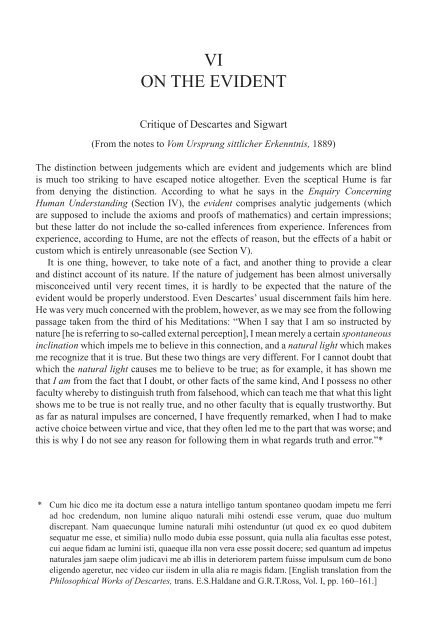Franz Brentano_The True and the Evident.pdf
Franz Brentano_The True and the Evident.pdf
Franz Brentano_The True and the Evident.pdf
Create successful ePaper yourself
Turn your PDF publications into a flip-book with our unique Google optimized e-Paper software.
VI<br />
ON THE EVIDENT<br />
Critique of Descartes <strong>and</strong> Sigwart<br />
(From <strong>the</strong> notes to Vom Ursprung sittlicher Erkenntnis, 1889)<br />
<strong>The</strong> distinction between judgements which are evident <strong>and</strong> judgements which are blind<br />
is much too striking to have escaped notice altoge<strong>the</strong>r. Even <strong>the</strong> sceptical Hume is far<br />
from denying <strong>the</strong> distinction. According to what he says in <strong>the</strong> Enquiry Concerning<br />
Human Underst<strong>and</strong>ing (Section IV), <strong>the</strong> evident comprises analytic judgements (which<br />
are supposed to include <strong>the</strong> axioms <strong>and</strong> proofs of ma<strong>the</strong>matics) <strong>and</strong> certain impressions;<br />
but <strong>the</strong>se latter do not include <strong>the</strong> so-called inferences from experience. Inferences from<br />
experience, according to Hume, are not <strong>the</strong> effects of reason, but <strong>the</strong> effects of a habit or<br />
custom which is entirely unreasonable (see Section V).<br />
It is one thing, however, to take note of a fact, <strong>and</strong> ano<strong>the</strong>r thing to provide a clear<br />
<strong>and</strong> distinct account of its nature. If <strong>the</strong> nature of judgement has been almost universally<br />
misconceived until very recent times, it is hardly to be expected that <strong>the</strong> nature of <strong>the</strong><br />
evident would be properly understood. Even Descartes’ usual discernment fails him here.<br />
He was very much concerned with <strong>the</strong> problem, however, as we may see from <strong>the</strong> following<br />
passage taken from <strong>the</strong> third of his Meditations: “When I say that I am so instructed by<br />
nature [he is referring to so-called external perception], I mean merely a certain spontaneous<br />
inclination which impels me to believe in this connection, <strong>and</strong> a natural light which makes<br />
me recognize that it is true. But <strong>the</strong>se two things are very different. For I cannot doubt that<br />
which <strong>the</strong> natural light causes me to believe to be true; as for example, it has shown me<br />
that I am from <strong>the</strong> fact that I doubt, or o<strong>the</strong>r facts of <strong>the</strong> same kind, And I possess no o<strong>the</strong>r<br />
faculty whereby to distinguish truth from falsehood, which can teach me that what this light<br />
shows me to be true is not really true, <strong>and</strong> no o<strong>the</strong>r faculty that is equally trustworthy. But<br />
as far as natural impulses are concerned, I have frequently remarked, when I had to make<br />
active choice between virtue <strong>and</strong> vice, that <strong>the</strong>y often led me to <strong>the</strong> part that was worse; <strong>and</strong><br />
this is why I do not see any reason for following <strong>the</strong>m in what regards truth <strong>and</strong> error.”*<br />
* Cum hic dico me ita doctum esse a natura intelligo tantum spontaneo quodam impetu me ferri<br />
ad hoc credendum, non lumine aliquo naturali mihi ostendi esse verum, quae duo multum<br />
discrepant. Nam quaecunque lumine naturali mihi ostenduntur (ut quod ex eo quod dubitem<br />
sequatur me esse, et similia) nullo modo dubia esse possunt, quia nulla alia facultas esse potest,<br />
cui aeque fidam ac lumini isti, quaeque illa non vera esse possit docere; sed quantum ad impetus<br />
naturales jam saepe olim judicavi me ab illis in deteriorem partem fuisse impulsum cum de bono<br />
eligendo ageretur, nec video cur iisdem in ulla alia re magis fidam. [English translation from <strong>the</strong><br />
Philosophical Works of Descartes, trans. E.S.Haldane <strong>and</strong> G.R.T.Ross, Vol. I, pp. 160–161.]
















